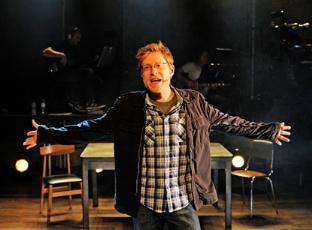For anyone who has seen Rent, which is just about everyone, it’s impossible not to have the melody of “Without You” pop to mind at the sight of the poster for Anthony Rapp’s one-man musical-theatre memoir, also called Without You. “It’s the song I sang at my mom’s funeral,” Rapp says. “Life goes on, it’s so true. It’s a beautiful irony that you will outlive some of the people you love.” Without You illustrates how Rapp dealt with the loss of both Rent’s creator, Jonathan Larson, and his beloved mother.
Just as in his career-making role in Rent, Rapp creates the universal from the very personal. “Rent was exceptional — the life force, the sense of melody. It was the real world in a musical theatre setting, the first time since Hair. It was an experience beyond spectacle, a gathering to witness life heightened. People would say, ‘I see myself up there’ and ‘It’s given me hope.’” Several performances of Without You feature post-show “talkbacks.” “I actually love doing them,” Rapp says. “They’re fulfilling discussions. As a person in the public eye, it’s good to share information.”
Rapp has been out since the beginning of his career and says, “It was lonely out there for a little while, but now so many people, even big television stars, come out with no scandal. If there was ever any detriment to my career, I don’t know about it. Ian McKellen said that coming out made him a better actor, there was more to access. It’s true: the liberation of yourself is good for your art. When we did Rent it was pre-Ellen coming out, pre–Will & Grace. When I was first listening to the demos of ‘La Vie Bohème’ and I heard ‘To faggots, lezzies, dykes, crossdressers too,’ it was like a jolt of energy from the boombox. It was thrilling.”
Almost 20 years later Rapp is still full of energy, but Rent has done one of its jobs. “Rent had a straight couple, a gay couple and a lesbian couple, but their sexuality was never discussed. A multicultural cast but no talk of race. It was just part of the fabric and it’s still remarkable.”
(Story previously ran in Fab magazine)

 Why you can trust Xtra
Why you can trust Xtra


